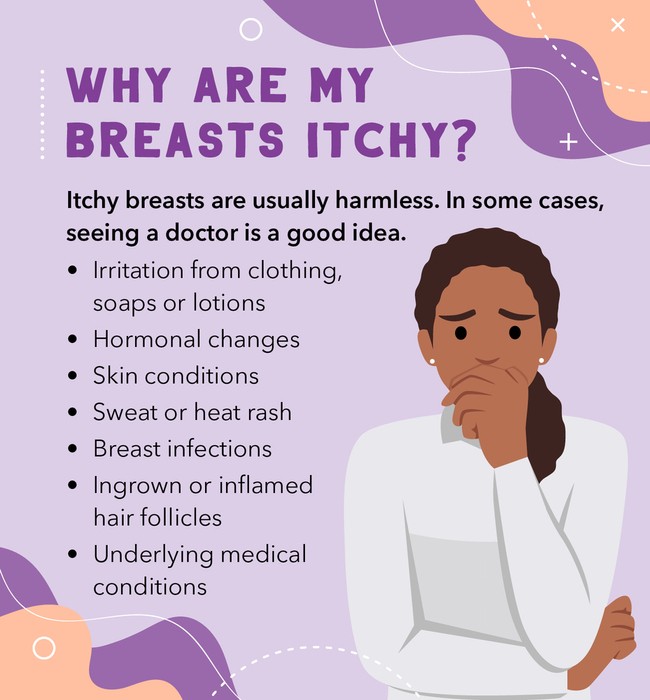Experiencing itchy breasts can be incredibly bothersome and raise concerns. While the sensation to scratch can be persistent, it’s reassuring to know that in many instances, the causes of itchy breasts are benign. However, it’s also important to be aware of situations where this symptom might warrant medical attention. Dr. Abby Sexton, DO, a trusted expert at UnityPoint Health, provides valuable insights into the common—and less common—reasons behind itchy breasts and guides you on when it’s crucial to consult a healthcare professional.
 reasons for itchy breasts infographic
reasons for itchy breasts infographic
Common Causes of Breast Itch: From Everyday Irritants to Hormonal Shifts
Itchy breasts can stem from a variety of factors, many of which are easily addressed. Let’s delve into some of the most frequent culprits:
Irritation from Fabrics, Personal Care Products, and Detergents
Our skin, particularly in sensitive areas like the breasts, can react to external substances. Everyday products that come into contact with your breasts, such as clothing materials, body washes, lotions, perfumes, and even laundry detergents, can trigger irritation or allergic reactions, leading to that persistent itch.
Contact dermatitis is a common condition in such cases. This occurs when your skin becomes inflamed after direct contact with an irritating substance. Identifying and eliminating the offending product or fabric is often the key to relief.
Dr. Sexton advises, “If you introduce a new product into your routine and subsequently develop a rash on your breast accompanied by itching, it’s wise to have it checked by your healthcare provider. This helps confirm whether it’s a simple skin reaction like contact dermatitis or if there might be another underlying cause that requires further investigation.” Your primary care physician, OB/GYN, or a dermatologist can provide expert guidance.
Hormonal Fluctuations and Breast Itching
Hormonal changes are a significant factor in women’s health, and they can also manifest as breast itching. These fluctuations are particularly noticeable in relation to the menstrual cycle. As you approach your period and estrogen levels rise, increased blood flow to the breasts can occur. This physiological change can lead to feelings of tenderness, swelling, and, yes, itchiness.
Experiencing itchy breasts around your menstrual period, whether regularly or occasionally, is generally not a cause for alarm. It’s often a normal physiological response to hormonal shifts. Managing stress and maintaining a healthy lifestyle can sometimes help mitigate these cyclical symptoms.
Skin Conditions Affecting the Breasts: Eczema and Intertrigo
Various skin conditions can specifically target the breast area, causing itchy rashes on, under, and between the breasts. Two common conditions are eczema and intertrigo.
Breast eczema can appear anywhere on the breast, including the sensitive nipple area. It can be easily mistaken for more concerning conditions due to its appearance, which often includes redness, inflammation, flakiness, or scaling, alongside intense itching. Given the potential overlap in symptoms with more serious conditions, Dr. Sexton often recommends a biopsy to definitively diagnose eczema and rule out other possibilities.
Intertrigo is another skin condition characterized by a yeast-like rash. It commonly develops in skin folds, such as the cleavage area or underneath the breasts, where friction and moisture accumulate. Intertrigo can be both itchy and painful, presenting as a bright red, irritated rash. In more severe cases, blisters or cracks may form in the affected skin. Keeping these areas clean and dry is crucial in managing intertrigo.
Sweat and Heat Rash: When Warm Weather Triggers Itching
Sweat and heat rash are closely related and often develop in areas where clothing or skin creates friction. On the breasts, these rashes can appear under the breast or on the sides, often due to the pressure or rubbing from bra bands, especially sports bras or underwire bras.
Dr. Sexton describes heat or sweat rash on the breast as a red, bumpy rash that can be both itchy and painful. The good news is that these rashes usually resolve on their own over time. To alleviate discomfort and promote healing, Dr. Sexton suggests opting for loose-fitting clothing, minimizing sweating, and allowing the affected area to air out as much as possible.
Breast Infections: Mastitis and Abscesses
Breast infections can also be a source of breast itching, particularly in breastfeeding women. If you notice a rash on your breast while breastfeeding, it could be mastitis, a common breast infection that is known for being both itchy and painful. Mastitis is characterized by a breast that feels warm and hardened, and appears red and swollen. Systemic symptoms like fever, chills, fatigue, and flu-like feelings often accompany mastitis.
A breast abscess, a collection of pus, can also develop as a complication of mastitis. It manifests as a red, swollen, and/or tender lump that is painful to the touch.
Ingrown Hairs and Inflamed Hair Follicles
Hair follicles on and around the breasts can sometimes become problematic. Ingrown hairs, appearing as small pimples, and inflamed hair follicles, which can be larger and resemble small abscesses, can cause itching and discomfort.
Dr. Sexton advises seeking medical evaluation for these issues to differentiate them from actual abscesses, which require different management. A breast abscess, as mentioned earlier, presents as a red, tender, and swollen lump, potentially with warmth and discharge, typically resulting from an infection.
Underlying Medical Conditions and Breast Itch
Itchy breasts, or rashes on the chest area, can sometimes be a symptom of underlying medical conditions. Conditions like diabetes, thyroid disorders, or liver disease can manifest skin changes, including itching.
Dr. Sexton explains, “As OB/GYNs, we frequently encounter breast concerns and are equipped to perform breast biopsies or initiate further investigations if necessary. Depending on the results of your tests, a referral to a breast surgeon might be warranted.” This highlights the importance of considering systemic health factors when addressing persistent breast itching.
Itchy Breast and Breast Cancer: Separating Fact from Fiction
A common concern when experiencing itchy breasts is the fear of breast cancer. It’s crucial to understand that while breast itchiness can be a symptom of certain breast cancers, it is far more often associated with benign conditions.
Dr. Sexton emphasizes, “Itchy breasts alone do not automatically indicate cancer. Other breast cancer symptoms are more indicative and include a palpable lump or bump. One-sided nipple discharge, especially if bloody or straw-colored and occurring without breast manipulation, is also concerning. Swollen lymph nodes without recent illness, breast pain, or lesions are additional symptoms that warrant medical attention.”
Rashes on the Breast: When to Be Concerned
Rashes on the breasts, as mentioned earlier, can arise from various causes. Common rashes like contact dermatitis, heat rash, or intertrigo typically affect both breasts. However, a mastitis rash is more likely to appear on only one breast, though it can occur bilaterally.
If you develop a rash on only one breast that doesn’t improve with home remedies, it’s prudent to schedule a medical check-up. Dr. Sexton advises, “The first step in evaluating a breast rash is a thorough breast exam to check for any lumps, bumps, bruises, or nipple discharge.”
Certain types of breast cancer, such as Paget’s disease and inflammatory breast cancer, can present with itching or a rash as a symptom.
Paget’s disease of the breast specifically affects the nipple and areola area, causing a scaly, red rash and itchy breast in that region. The rash may also be painful and crusty. While Paget’s disease is often associated with underlying breast cancer, it’s not always the case.
Inflammatory breast cancer, though rare, is an aggressive form of breast cancer typically diagnosed at a later stage. It accounts for a small percentage of all breast cancers. The rash associated with inflammatory breast cancer has distinct characteristics: redness covering more than one-third of the breast and skin dimpling resembling an orange peel. This large, red patch on the breast can be accompanied by swollen lymph nodes in the armpit or collarbone area, breast swelling, tenderness, itchiness, and warmth. It’s important to remember that swollen lymph nodes can also occur with infections like mastitis and are not solely indicative of cancer.
Red Bumps and Black Patches on the Breast: What They Might Mean
A single red bump on the breast can have several benign explanations, including:
- Angioma (a benign growth from blood vessels)
- Bug bites (from mosquitoes, spiders, chiggers, etc.)
- Inflamed hair follicles
- Pimples
- Red moles (cherry angiomas)
- Minor trauma
If a red bump persists and doesn’t resolve on its own, medical consultation is recommended.
Black patches on the breast are most likely skin moles. Dr. Sexton clarifies, “Similar to moles appearing elsewhere on the body, breast moles can also become cancerous, specifically melanoma, although breast cancer itself is less common in moles.” Regularly monitor any freckles or moles on your breasts and seek medical evaluation if you notice changes in size, color, or appearance, as a biopsy may be advisable.
Itchy Breasts During Pregnancy and Menopause: Hormonal Connections
Itchy breasts are a common symptom during both pregnancy and menopause, primarily due to hormonal fluctuations.
During pregnancy, as your body prepares for breastfeeding, hormonal shifts lead to breast enlargement, increased sensitivity, and a tendency towards itching. These hormonal changes can cause skin dryness and irritation, contributing to itchiness. Increased blood flow to the breasts during pregnancy also enhances sensitivity.
Similarly, itchy breasts during menopause are often linked to hormonal fluctuations, leading to dryness, irritation, and heightened breast sensitivity.
However, Dr. Sexton notes that she observes breast itchiness more frequently in premenopausal women than in menopausal women. She advises, “If breast itchiness suddenly develops during menopause, especially without any changes in your routine, it’s worth getting it checked out to rule out other causes.”
When to Seek Medical Advice for Itchy Breasts
It’s always best to err on the side of caution and consult a doctor if you experience persistent itchy breasts, whether accompanied by a rash or not.
Dr. Sexton recommends, “It’s advisable to inform your doctor about your symptoms if your itchy breasts are new, persistent, unrelated to your menstrual cycle, and not associated with changes in detergents or soaps—especially if you haven’t had a recent breast exam or mammogram.”
Depending on the underlying cause, your doctor might recommend observation, topical treatments like ointments, powders, or creams for itchy breast relief. Over-the-counter antihistamines such as Zyrtec or Claritin may also be helpful in some cases. If the rash and/or itching resolves with conservative management, it’s generally less likely to be a serious concern.
However, Dr. Sexton emphasizes, “If a rash persists and doesn’t resolve, it’s important to return for a biopsy to ensure accurate diagnosis and management. Being proactive and cautious is always a good approach.”
Find a DoctorMyUnityPoint

